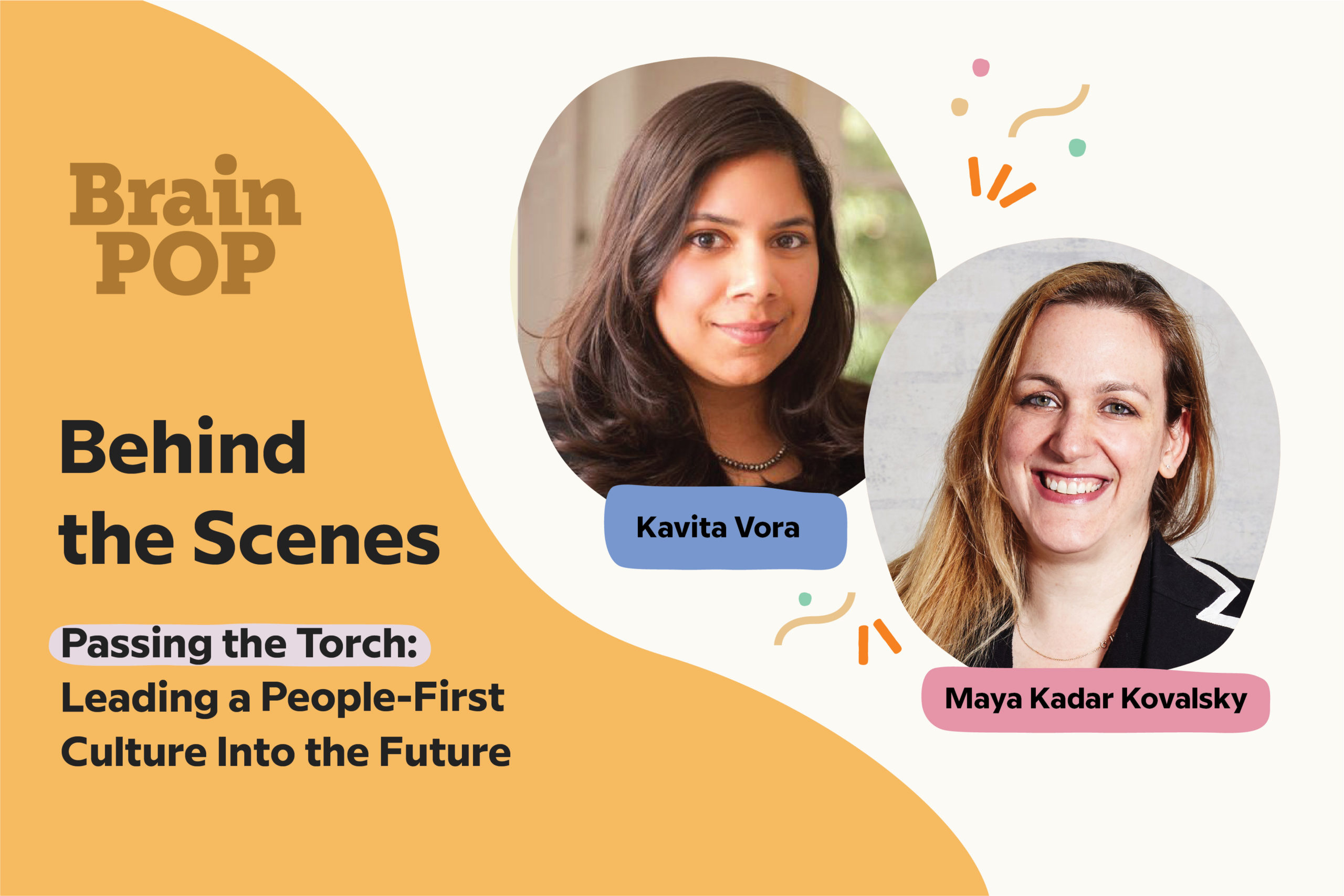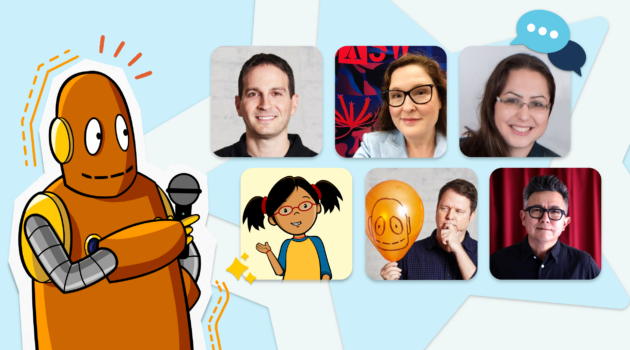Behind the Scenes
Passing the Torch: Leading a People-First Culture Into the Future

Photos provided by interviewees
Building an empowering and inspiring organizational culture is both an art and a science—the product of hundreds of decisions made over time and in close partnership among many individuals. I sat down with two women at the forefront of culture at BrainPOP: Chief People Officer Kavita Vora, who joined the company in late 2021, and Maya Kadar Kovalsky, who originated the role in 2016, and today serves on the BrainPOP board of directors. We spoke about their prized work values, unique professional journeys, and shared focus on cultivating an employee-centric workplace that grows and evolves with its people.
Maya and Kavita, what exactly is “company culture”?
MK: I like to define company culture as the shared behaviors of everyone in an organization, from rituals to the way we solve problems. It’s the shared language of an organization.
KV: It’s also how work gets done organically. A company can be very policy- and procedure-heavy, with a lot of rules to follow. Or, I believe if you have a very strong culture, people organically make decisions, understand how to prioritize, and know the right thing to do. It’s much more instantaneous, versus having to consult a manual in a given situation. People hear the language used, know how decisions are made, and see what their colleagues prioritize. That creates models for them to follow.
People often equate culture with special events, guest speakers, and professional development. What role do these activities play in building culture? Are they a reflection of a company’s values?
MK: “Reflection of values” is the perfect term. Company culture reflects how we use our values to make decisions every day. Events and professional learning support the creation and reiteration of those values in different ways, so it all becomes part of a complete narrative.
Reinventing Company Culture
True or false: Companies need to reinvent culture for a post-pandemic world. What can we let go of, and what is indispensable?
MK: True. Company culture always changes, and it has evolved so much over the last few decades—not to mention during the COVID-19 pandemic. We need to let go of preconceived notions about how, what, and when work is done. We should not judge employee performance by how much time they spend in the office or in front of our eyes. Choice and flexibility are indispensable.
KV: True. Innovate on your legacy culture and core values while continuously improving in areas that aren’t working. Don’t try to force fit an old culture in a new world. Listen to and learn from your team. Let culture go where it wants to go. Especially in a remote or hybrid environment, leaders need to be creative and open-minded to build an equitable, inclusive, and transparent work environment for all employees.
You each took a different path to become leaders. Can you share your stories?
MK: I started my career in film and television, and I was brought into BrainPOP to take on a temporary role overseeing BrainPOP ELL, our English language learning product. At the time, I thought I would stay for three to six months, tops. I didn’t expect to fall in love with working at this company, and with the people, who are so devoted to and passionate about their work.
It was the best of both worlds. I was able to apply my knowledge of film production to create engaging stories for BrainPOP ELL, and I was a bit of a community organizer, leading an internal committee working on intra-office improvements. I really wanted employees to feel like BrainPOP was a second home. That was my driving motivation.
Long story short, when we completed BrainPOP ELL, the BrainPOP executive team asked me to officially take on the role of chief culture officer. At a certain point, my team joined forces with human resources, and I oversaw everything from talent recruitment and retention to professional learning.
I really wanted employees to feel like BrainPOP was a second home. That was my driving motivation.
KV: Maya, because of your product background, I think you led the way a product leader would, by asking, “What is the ‘customer journey’ we want to take employees through to make sure they have a great experience?” That includes onboarding, offboarding, and the special moments in between that make employees want to stay. I’ve seen you infuse a product mindset into our employee experience, which is a big part of our company culture.
As far as my path, I was passionate about corporate social responsibility. I double majored in finance and philosophy. For my finance thesis, I did a lot of analysis to demonstrate that socially responsible companies could be as profitable as, or more profitable than, the general population of companies. (At that time, it was a controversial idea!) My philosophy thesis addressed the idea that corporations are moral agents with a responsibility to society. I always had the conviction that a company can do well and do good.
I started my career in finance, and as I moved into more senior positions, I realized that the parts of the role that I loved most were managing a team and developing strategy and priorities. I was so curious about “the people side,” so I decided to go to business school and move into HR. I worked at big companies to learn best practices, but I always had an entrepreneurial spirit, so I went to work for Fortune 25 and Fortune 50 companies and then got into tech startups.
I always had the conviction that a company can do well and do good.
Did you have a “passing the torch” moment, or was the transition more organic?
MK: I felt very safe handing over “my baby,” so to speak. Kavita and I share a common language. I have a partner who is listening with an open mind. I’m a big believer in trust, so the best thing I could do was share what I know and trust Kavita to take it to the next level.
KV: I felt very quickly that there was a high level of trust and empowerment, and that’s a big responsibility. Maya curated our culture over many years. I think about how to preserve what is special, unique, and positive, while bringing my own perspective on culture, and incorporating employee feedback, in order to evolve it.
What is your leadership style?
KV: My approach is one of servant leadership, which is to say, I lead from behind. I want to support and empower the people I work with, and see them shine in the spotlight.
MK: I’m big on listening and giving feedback.
KV: I definitely see you acting like a role model. Whatever you ask other people to do, you do it first. You’ll present something, or put yourself in an awkward moment, to make it interesting and give it a different style.
I can attest to that. I have a vivid memory of Maya wearing a unicorn suit to a Halloween costume contest at the office. That’s just Maya. She’ll jump into the pool before everyone else. Speaking of the team, how do you describe the DNA of BrainPOP?
MK: It’s very closely linked to the way our product feels, which is quirky, unique, curious, creative, and a little nerdy. We’re the kids who want to do well in class, and we’re proud of it! We’re also very kind to one another.
Is there an iconic BrainPOP event or milestone that reflects our company culture?
MK: Before the pandemic, BrainPOP employees from around the world traveled to our New York City headquarters for a winter holiday week of collaborative work, learning, and celebratory experiences. It always culminated with a wonderful holiday party. Some of my favorite celebrations include watching the original production of Hamilton on Broadway, listening to live performances by the Preservation Hall Jazz Band and Billy Joel, and eating dinner under the stars at the American Museum of Natural History’s Hayden Planetarium.
We also put a lot of emphasis on creating a family-friendly environment. I am especially proud that we evolved our family leave policy in recent years to create parity for all parents and caregivers. A secondary caregiver is entitled to the same leave as a primary caregiver, so non-birthing parents can take time off when a baby is born or adopted.
Do you have a favorite work value?
MK: Act like an owner. Ownership comes from feeling like this is my home, taking pride in it, and wanting to share it with others.
KV: Lead with empathy. I may not always agree with someone’s perspective, but I try to understand it before forming an opinion or coming to a decision.
What advice would you give…
…your younger self?
MK: Trust your instincts, and don’t let anyone make you feel less than—because you know what you’re talking about. Your path may not always make sense along the way, but you will eventually get to your destination, so don’t worry. Keep learning and strive to make work fun.
KV: Strive for work-life balance early on in your career. Prioritize health and wellness as much as you prioritize work. Discover your “superpowers,” and lean into them—they will energize you, and work won’t feel like work. Establish your personal board of directors (trusted colleagues, friends, and family), and lean on them for their advice and insights to help you identify your natural strengths.
…a recent college graduate joining a company?
MK: First of all, write down everything. If you go into a meeting with your manager, your team, or anyone, take notes and make lists. It will help you to stay organized and figure things out. Always follow up and close the loop. Secondly, you won’t always feel confident when you start something new, but don’t let that limit you. Seek the information you need to make good decisions. Confidence comes with experience. Envision and strive to be the employee, colleague, and friend you want to be, and you will get there faster.
KV: Deliver on your commitments. Speak up early and often if you need help or identify a risk. That’s how you build trust.
…an aspiring manager?
MK: Propose a new idea or way of doing something for the good of the company, which will also help you advance. Management is not about you; it’s about leading a team and helping other people grow and learn. It’s also about facilitating communication between executives and individual contributors to help the company succeed. Make time for team building, not just getting the work done. Make the process engaging, fun, and inclusive, and people will feel motivated and accomplish their goals.
KV: Don’t wait for someone to make you a manager. Start establishing yourself as a leader by being a strong collaborator, mentor, and team player, and others will turn to you with opportunities. Volunteer for special projects and join committees to develop your leadership skills and make a business impact beyond your primary role and responsibilities. You’ll develop your skill set and your personal brand, too.
Ilana Kurizki is VP, communications and social impact at BrainPOP.






